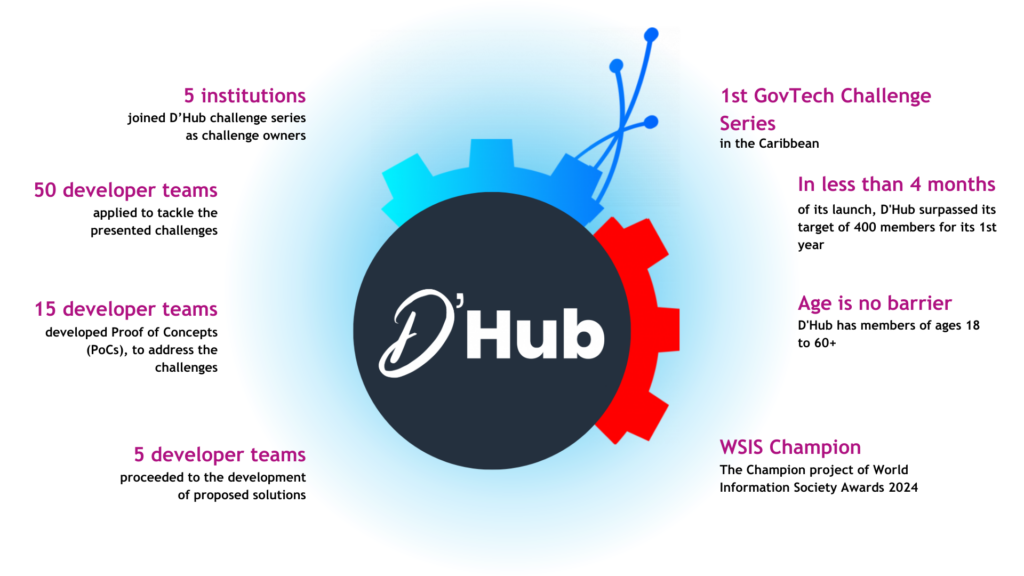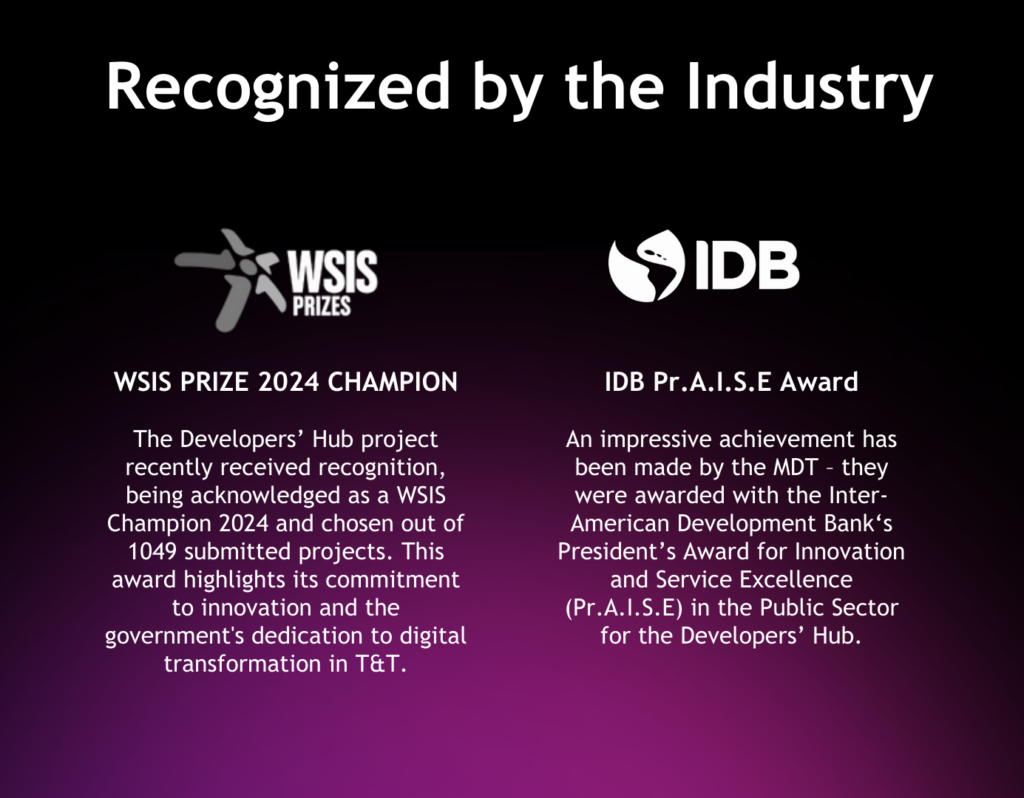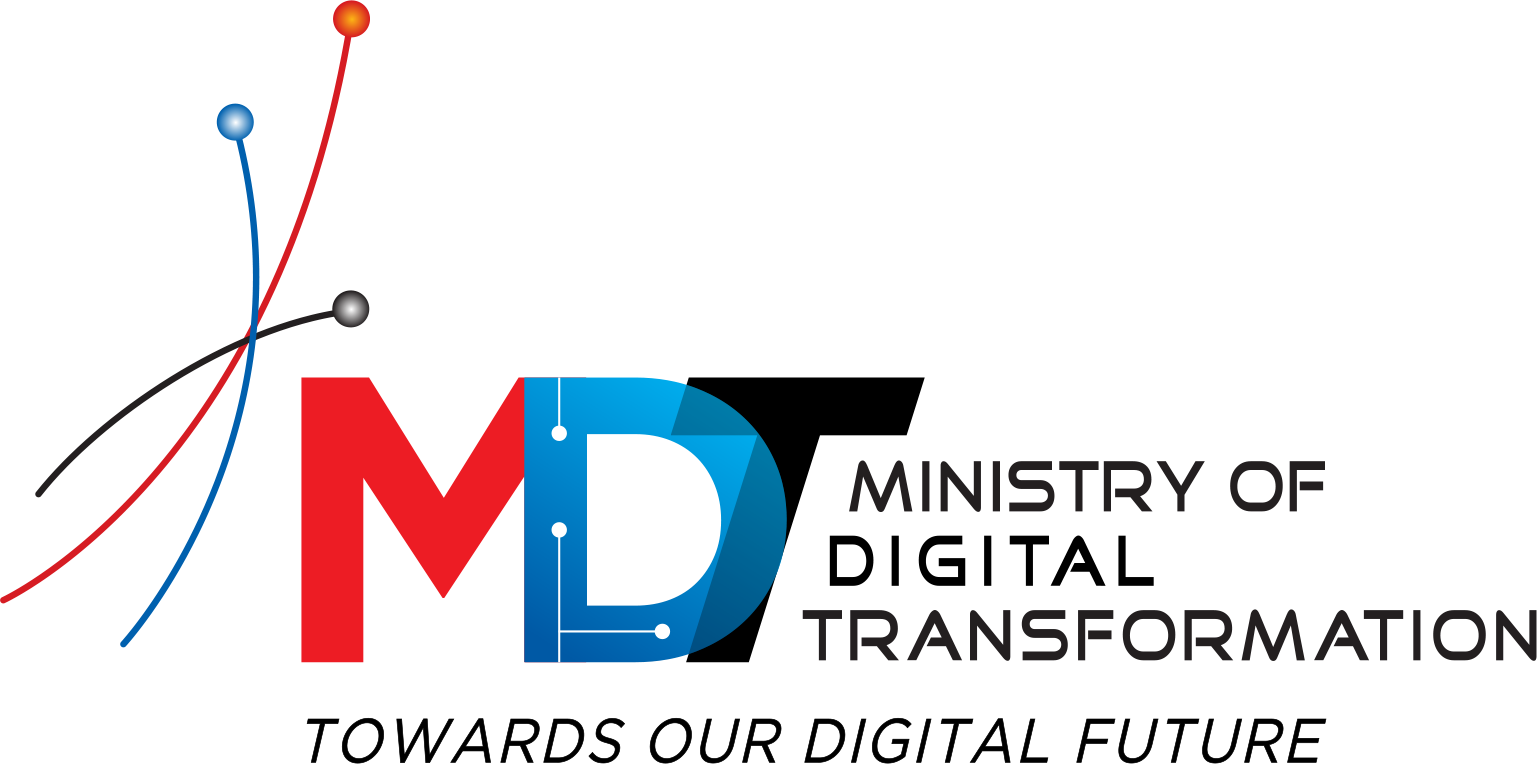About the client
Trinidad and Tobago – The Ministry of Digital Transformation (MDT)
The mandate of The Ministry of Digital Transformation is to address the end-to-end consumption and delivery of goods and services to customers, using appropriate digital technology. This mandate is supported by three pillars of delivery:
- Digital Society – Digital Society is about ensuring that everyone has access to affordable ICTs. This involves creating an appropriate environment for technology that is robust, reliable and builds the skills needed by our citizens so they can realize the greatest benefits from Digital Technology.
- Digital Economy – Through the Digital Economy Pillar, Trinidad and Tobago aims to double the contribution of the ICT Sector from its current level of 4 percent to 8 percent. The key to achieving this goal is the ability of the private sector and government to work collaboratively and in sync with the National Economic Recovery Plan.
- Digital Government – The goal is to provide better government services and more efficient government. This includes the digitization of Government information which will be evident from the increasing amount of information and services freely available on Government websites; The digitalizing of business processes, through the adoption of appropriate Digital Technology; Government will take the necessary steps towards the creation of the Enabling Environment needed for Digital Transformation.
Challenges
According to Inter-American Development Bank (IDB), the country’s position on the global e-Government ranking fell from 70 in 2016 to 81 in 2020 (out of 193 countries), and there are important institutional weaknesses in the public sector such as low levels of digitalization in government, archaic systems, undeveloped human capital, opaque policy making and a lack of data. Thus, acelerating economic transformation by leveraging digitalization and new technologies could help the country address the main development challenges particularly in the context of the pandemic and the need to develop economic resilience to unexpected shocks. Furthermore, according to the World Bank, the country’s Core Government Systems Index and Public Service Delivery Index are below the regional averages.
The main challenges faced by the country were the costs associated with adopting new technologies, the shortage of skilled workers proficient in digital technologies, and the lack of collaboration between the public and private sectors.
Solution
The overall objective of the project “Developers’ Hub – Technical Advisory Services” was to provide advisory services to the Government of the Republic of Trinidad and Tobago for the design and implementation of the Developers’ Hub and the Developers’ Hub Challenge.
The Developers’ Hub is a virtual platform, which encourages, enables, supports, and hosts the collaborative development of open-source programs and applications of specific interest to the Government. It provides and promotes opportunities for individuals and small/medium enterprises to partner with Government and participate in the development of open-source software applications, which enable and/or deliver services to citizens via digital channels. The Hub aims to maintain a specific focus on the creation of e-services and mobile applications to assist the Government in delivering more efficient services to the public.
The D’Hub Challenge Series, a key component of the enabling layer, offers a structured framework for local talent to propose and implement innovative digital solutions and business ideas aimed at addressing important public sector, social, economic, and environmental needs in the country. The established framework provides flexibility for the country to address specific challenges that are of high priority for them, without the need to recreate or reinvent a process
Services provided by NRD Companies
The Project focused on handholding and building the capacity within the MDT and other stakeholders to implement the Developers’ Hub award scheme – one of the building elements of the Developers’ Hub.
Specific components of the Project included:
- Providing recommendations for finalizing the award scheme design and implementation.
- Assessing gaps in the government ecosystem and the outcomes of the call for applications.
- Conducting knowledge transfer and capacity building for MDT and other institutions in the country through dedicated workshops and meetings.
- Assessing training needs and providing capacity building support for selected developers.
- Providing practical workshops for joint developers and public institutions teams co-creating digital solutions for public challenges
- Preparing a lesson learned and final report on the outcomes of the award scheme.
Throughout multiple field missions conducted as part of the project, the consultancy team organized diverse workshops and training sessions. These sessions covered topics directly relevant to the overarching GovTech approach and its nuances, including the setup of GovTech challenge series, innovations within the public sector, collaborative efforts between public sector institutions and startups, defining problems and solutions, emphasizing value propositions, prioritizing user-centricity in GovTech projects, and mastering the art of pitching for Public Sector Innovation.
Results
Through its work, NRD Companies successfully achieved the following:
- Enhanced Award Scheme Design: NRD Companies recommendations contributed to a well-defined and efficient award scheme framework. The pilot award series attracted a significant number of applicants and resulted in 15 Proof of Concepts (PoCs) addressing public sector challenges.
- Capacity Building: NRD Companies conducted workshops and training sessions, equipping MDT and iGovTT with the necessary knowledge and skills to manage future challenges and initiatives.
- International Recognition: D’Hub, with NRD Companies support, was nominated as a champion within the domain of “enabling environment” for the highly prestigious World Summit on the Information Society Forum Awards.

Key Accomplishments to date:
- In less than 4 months after its launch, D’Hub surpassed its target of 400 members for its 1st year. To date membership is 683.
- Female participation has steadily increased and is now at 30%. With current plans, we hope to increase this amount to 50% in the near future.
- Age is no barrier – D’Hub has members aged 18 to 60+
- D’Hub has garnered members across the nation, reflecting a widespread geographic outreach and diverse representation.
- There have been 234 enrollments in Linux Foundation Courses & Uptake of 42 SimpliLearn Licenses and 94 Coursera Licenses by D’Hub members thus far. Additional licenses will be distributed in the upcoming months.
- Government Agencies have started to embrace the GovTech Approach.
- 12 Challenges were received and 5 Shortlisted.
- 50 Proposals received from D’Hub members (total of 61 participants)
- 15 Teams selected and awarded TT$50,000 to develop their idea into a Proof of Concept (POC) (total of 29 participants).
- 15 POCs completed and currently being evaluated for an award of TT$350,000 to develop into MVP, which will be awarded to 5 developer teams across all 5 challenges.
Awards
In April 2024, the D’Hub project was recognized as a WSIS Champion in the Enabling Environment category. This prestigious global award is a great indicator of how innovative and unique the D’Hub project is. Out of 1,049 submitted projects, only 360 were shortlisted for the voting stage, and from these, just 72 were recognized as WSIS Champions in different categories related to the United Nations’ SDGs.
It’s also worthwhile mentioning that D’Hub received the Inter-American Development Bank’s President’s Award for Innovation in the Public Sector, highlighting its commitment to innovation and the government’s dedication to digital transformation in T&T.

Quote from client
Employing home grown programmers for local government projects can be a win-win situation for both the programmers and the government, as they can create mutually beneficial outcomes that enhance the quality, efficiency, and impact of the projects. As indicated by Minister Bacchus, “In the ever-evolving world of technology, Trinidad and Tobago must stay ahead of the curve. The D’Hub Challenge is our commitment to nurturing home-grown talent and providing them with the tools and support they need to innovate. Our objective is that, through the developer’s hub, we will add many e-services over the next two to three years.”
SDGs addressed

Ensure inclusive and equitable quality education and promote lifelong learning opportunities for all:
- D’Hub promotes inclusive education by providing opportunities for continuous learning and skill development, at no cost to the user, via a universally accessible platform. This ensures that individuals, regardless of background, have access to opportunities for personal and professional growth.
Achieve gender equality and empower all women and girls:
- D’Hub actively works towards gender equality by actively encouraging the participation of women in D’Hub. Initiatives such as Implementing a D’Hub Challenge Series Track specifically for women, along with targeted campaigns and training opportunities specifically for women are being planned and implemented, to encourage women to engage, learn, develop and earn in the industry.
Promote inclusive and sustainable growth, employment, and decent work for all:
- D’Hub contributes to inclusive growth by equipping individuals with digital skills at all levels. The platform also promotes opportunities for employment in the digital economy via the job/gig board that is currently being implemented and a future online marketplace that will provide opportunities for developers to earn revenue locally, regionally and internationally.
Build resilient infrastructure, promote sustainable industrialization, and foster innovation:
- D’Hub is a catalyst for innovation. The D’Hub Challenge for e.g is one such program offered by D’Hub that fosters innovation via a call for innovative digital solutions that will address important public sector, social, economic, and environmental needs in T&T.
Revitalize the global partnership for sustainable development:
- D’Hub engages in global partnerships, collaborations, awards, and knowledge sharing to advance sustainable development goals, fostering collective action for global progress.













